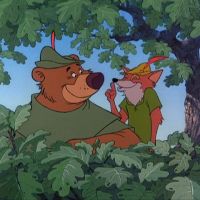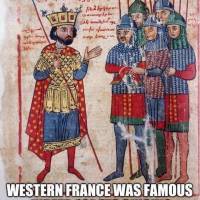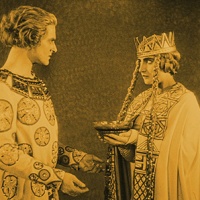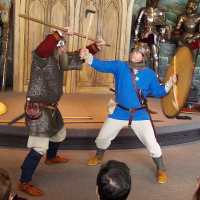In The Hobbit: An Unexpected Journey, we get a glimpse of Smaug the dragon. Dragons love gold above anything else and Smaug is no exception – he coils himself around the treasure horde of the dwarf king under the mountain.

Don’t worry Tolkien Estate, it was only a bit of fun for a batch of homebrew!
In a tale from Norse Mythology, a dragon plays the role of a man corrupted by the greed of gold. This corruption manifests itself physically. It changes the person, sort of like how symptoms of a physical or mental illness can change a person’s appearance and personality.
Though dragons are creatures in Norse Mythology – we shouldn’t confine ourselves to always thinking of them in that literal sense. They do not always hatch from eggs as do chickens or snakes. Men can become dragons.
In the tale of Otter’s ransom, we have Fafnir the dragon. He, like Smaug, hordes a trove of treasures mined and crafted by dwarves. But unlike Smaug, Fafnir was not born a dragon. He becomes a dragon from the greed of gold – greed of a particularly cursèd horde of gold: Otter’s ransom.
One day Odin, Loki and Hoenir were traveling in Midgard, the land of men. They followed a river which brought them to some falls. There, they noticed an otter eating a salmon. Only it wasn’t actually an otter – it was Hreidmar’s son Otr in the form of an otter:
There hunted hungry
Hreidmar’s offspring:
the silver salmon
sweet he thought them.
Otr in otter’s form
there ate blinking,
on the bank brooding
of black waters.[1]
Loki, never one to miss an opportunity for mischief and games, picked up a stone by the riverbank and threw it at the unwitting creature who sat there feasting on its catch:
Then Loki boasted of his catch – with one throw he had bagged an otter and a salmon. They took the salmon and the otter away with them and came to a farm which they entered.[2]
They called at the gate of the farm. When the owner, Hreidmar, asked who it was at the gate, Odin called out to him, “We are three travelers looking for a night’s lodging. We bring a salmon and an otter fur, both of which you are welcome to it in exchange for your kind hospitality!”
Hreidmar quickly called his two sons, Fafnir and Reginn, to his side and told them that their brother Otter had been killed and that his murderers were waiting at the gate wanting supper and a bed for the night.[3]
Fafnir and Reginn came at Odin, Loki, and Hoenir with fore-hammers of the smithies to kill them, accusing them of killing their brother Otr, who often shape-shifts as an otter when he fishes by the falls. As there was a blood price in those days for killing kin, Odin asked Hreidmar what Otr’s blood price would be:
“Peace,” said Odin. “We have slain thy son, it would seem, but it was unwittingly that we did the deed. We will give a recompense for the death of thy son.”[4]
Hreidmar named a blood price for Otr. They would bring a piece of treasure for every hair on the otter skin as Otr’s ransom:
Redgolden rings.
Ransom costly,
This fell must fill,
This fur cover![5]
Since Loki got them into this mess, Odin and Hoenir made Loki go to Svartalfheim, the world of dwarves, and bring back the dwarf Andvari’s horde.[6]
There he searched until he found a silent black lake, and in that lake he wriggled his fingers… until they closed upon the gills of a large pike, which Loki jerked up onto the shore.[7]
“What fish have I found
in the flood leaping,
rashly roaming?
Ransom pay me!”[8]
It was Andvari in fish form. Loki told him that he would let him go only if he paid Otter’s ransom. Andvari reluctantly agreed and turned back into his dwarf form. Andvari gave Loki all of his gold, but kept from him one single ring. Loki noticed this, and demanded that Andvari give up the ring:
“What hides thy hand
Thus hollow bending?”[9]
To which Andvari replied:
“The ring is little –
Let it rest with me!”[10]
But Loki would not let Andvari short Otter’s ransom:
“All, Andvari,
All shalt render,
Light rings and heavy,
Or life itself!”[11]
If Andvari gave up this perfect ring to Loki, he would lose his ability to make treasures. This ring, like the Philosopher’s stone, was free of any impurity. He who has this ring, possesses the secret power of making gold. Andvari cursed Loki for taking the ring from him:
“The ring with the rune
Of power upon it:
May it weigh down your fortune,
And load you with evil,
You, Loki, and all
Who lust to possess
The ring I have cherished.”[12]
This wasn’t the first time anyone had cursed Loki. So why should he put any stock in this angry old dwarf’s threats? After all, Loki won the gold fair and square – it’s not like Andvari saw him coming.
So Loki brought Andvari’s horde, and the ring, back to Odin. Since Odin quite liked the ring, he kept it for himself. Hreidmar flayed the otter, filled the inside of the skin with gold and then covered every little hair. After the very last piece of gold was placed on the otter’s skin, a single whisker remained. Realizing the ransom was one treasure short, Odin surrendered the ring to Hreidmar. It covered the whisker and Otter’s ransom was paid. With their debt paid, Hreidmar let Odin, Loki, and Hreidmar go.
After their guests from Asgard left, Reginn and Fafnir asked Hreidmar for shares of the gold. Hreidmar refused their request – he would not even part with the smallest bit of copper. Reginn and Fafnir turned against their father and murdered him for his horde. After this was done, Reginn realized that Fafnir had no intention of sharing the gold either. Fafnir told his brother Reginn that if he ever tried to take some of the gold for himself, he would kill him. Reginn left the farm and:
…Fafnir went up on to Gnita Heath and, making a lair there, turned himself into a dragon and lay down on the gold.[13]
The cursèd ring from Otter’s ransom – the piece of treasure that covered the very last whisker on the otter’s dead body, which had the power to pit father against sons and brother against brother, turned Fafnir into a dragon. It also played a part in causing the tragic deaths of Sigurd and the Valkyrie Brynhild – and, depending on your interpretation, even played an important role in bringing about Ragnarök – The Twilight of the Gods – “THE END OF THE WORLD!!!!…or the beginning,” as Aughra from The Dark Crystal would say…

Aughra tells Jen about the Great Conjunction in The Dark Crystal. image copyright: 1982 Universal Pictures/Sony Pictures/The Jim Henson Company
[1] J.R.R. Tolkien, “The New Lay of the Völsungs” The Legend of Sigurd and Gudrún Ed. Christopher Tolkien (Houghton Mifflin Harcourt: New York, 2009), 67.
[2] Snorri Sturluson, The Prose Edda, trans. Jean I. Young (Berkeley, 1954), 110. (Italicized emphasis: mine)
[3] Douglas “Dag” Rossman, The Northern Path (Seven Paws: Chapel Hill, 2005), 72.
[4] Padraic Colum, Nordic Gods and Heroes (Dover: Mineola, 1996), 144.
[6] Some say Loki went to Queen Aegir who gave him a magic net with which to catch Andvari and that Loki returned to the same falls – Andvari Falls. As deeds are always returned in Norse Mythology, a magic net was also used to catch Loki when he tried to hide in fish form from the Gods when they brought him to justice for killing Baldur.
[13] Snorri Sturluson, 112.













